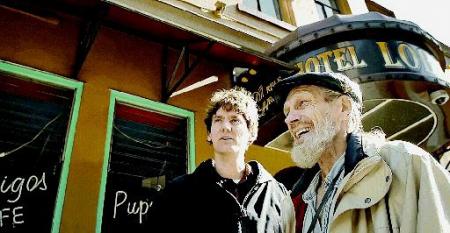Maurice Bridge
Sun

Marble Arch Hotel: Avery Broadbent, 65, right, with David Eby, of Pivot Legal Society, lives in the Marble Arch, one of 10 hotels bought by the provincial government. Photograph by : Mark Van Manen, Vancouver Sun

In a dramatic move to deal with homelessness, the provincial government has purchased 10 single-room occupancy hotels in Vancouver with a total of 595 rooms.
The move is part of an $80-million initiative to preserve affordable housing announced Tuesday by Premier Gordon Campbell in Vancouver.
Campbell also announced the purchase of an SRO hotel in Victoria, four other housing units in Vancouver and Burnaby, and the funding of 287 planned social-housing units in Vancouver.
In all, the province will purchase or fund a total of 996 units.
The Vancouver SRO hotels, which provide shelter for those at the lower end of the economic scale, have been at the centre of a fierce fight in recent years over homelessness and property redevelopment as soaring residential real-estate values have put increasing pressure on low-income housing stock.
Working in secrecy, the province struck deals with the hotels’ owners over the past 60 days, and acquired the buildings for about $45 million. Possession dates range from this week to mid-May.
Vancouver Mayor Sam Sullivan hailed the move and said he has been working on this project for more than a year, asking various levels of government to invest in low-income housing.
“We have the largest commitment to social housing in history,” he said. “I think today is the day we begin to turn the tide on homelessness. This is a wonderful day.”
Sullivan noted the city had already committed itself to acquiring one SRO hotel a year.
“Think about it,” he said. “In one day, we’ve done 10 years’ worth of effort.”
Rich Coleman, the provincial minister responsible for housing, promised those who occupy the rooms in the SROs will not be evicted during renovations to bring them up to standard. He said the cost of the renovations is estimated between $5,000 and $15,000 per unit, and should be completed by the end of 2007.
Campbell said the refurbished housing, which he called “supportive housing,” will come with social support for its occupants.
“Our real goal here is to make sure that people who need housing supports are finding those supports,” he said.
“We can take them and put them through transition with health care and addiction services and other kinds of social-support services so they can move on to other housing types.”
Coleman said the key to operating the new housing will be cooperation and consultation with non-profit groups with experience in the field.
He said the province will be talking to these groups in the next 30 to 60 days to discuss which groups will partner with the province in the operation of individual buildings. Talks will also be held with the current operators of the buildings to discuss operations and to determine whether any operating subsidies will be required.
The initiative was praised by those who have fought for low-income housing in Vancouver’s Downtown Eastside.
“I think it’s good news,” said David Eby of Pivot Legal Society. “I think it’s an important first step to preserving the housing in the Downtown Eastside that we need for low-income people.”
Mark Townsend of the Portland Housing Society, which provides low-income housing, said he was taken by surprise by the provincial move, but added he approves of it.
Although Campbell said the province was not swayed by repeated demonstrations and legal battles over low-income housing, Eby said he believes public pressure led to the hotel purchases. “I think it’s a direct result of the concerted advocacy that has taken place by Downtown Eastside groups,” he said. “I know that without the advocacy we’ve had around housing in the Downtown Eastside, this announcement wouldn’t have been made today.”
He said with continued advocacy, he expects to see the creation of additional housing units to get people off the street.
Campbell indicated there could be more such purchases in the future, but did not specify any details about such plans.
“This is not the end of this,” he said. “This is part of an ongoing program to stabilize our communities, create opportunity and affordable housing and really connect people with the services that they need.”
Provincial Opposition leader Carole James was less impressed by the premier’s announcement.
“We have to remember that it’s this government that created the crisis to being with,” James said in a telephone interview from Cranbrook.
She said the Liberals cut the housing program in 2001 when it was building an average of 1,200 units a year.
PROVINCE BUYS 10 DOWNTOWN HOTELS FOR SOCIAL HOUSING
Mayor Sam Sullivan calls the provincial government’s $80-million investment in supportive housing in Vancouver, Victoria and Burnaby “10 years’ work in one day.”
© The Vancouver Sun 2007

